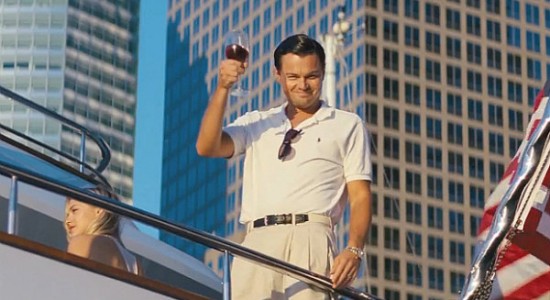Sunday January 05, 2014
Indicting the Audience: Hollywood, the Dream Factory, Tries to Wake Us Up in 'Wolf of Wall Street,' 'Her' and ... 'Anchorman 2'?

Sweet dreams, America.
Hollywood has long been known as the dream factory. It shows us who we want to be rather than who we are. It lies to us at 24 frames a second.
Is Hollywood now tired of its lies? Of our need for those lies?
Three late-season movies that have almost nothing in common have this in common: They indict the audience, us, for our lack of seriousness; for our overwhelming wish for the sugar-coated world; for buying into the lies.
In Spike Jonze’s “Her,” Thedore Twombly (Joaquin Phoenix) falls in love with his operating system (voiced by Scarlett Johansson), which is obviously a form of fantasy, but that’s not what I’m thinking of. I’m thinking of an early moment on the subway home when he’s offered the news of the day via earbud. Conflict in the Middle East? Skip. Budget battles in D.C.? Skip. Photos of sexy, pregnant soap opera star? Pause. Open.
That’s us. Sadly. Or inevitably. In Jonze’s hands, gently.
“Her” is set in the near future while “Anchorman 2” is set in the near past: 1980 and the birth of 24-hour cable news. It’s also the birth of the Hollywoodization of the news. The whole movie (and, it’s implied, our entire culture) turns on one thought, first voiced by Will Ferrell’s bumbling everyman Ron Burgundy: What if we didn’t give people the news they needed to hear but instead gave them the news they wanted to hear? So that’s what happens. Instead of interviews with Yasser Arafat, it’s shots of fluffy animals and footage of high-speed car chases and an overwhelming patriotic flavor. “Don’t just have a great night,” Ron tells his audience as he signs off, “have an American night.” It’s a short step from there to Sean Hannity.
Eventually Ron learns the error of his ways but of course we never did. We keep buying into the lies Ron started. Even in the near future, we’re still Theodore, tired and lonely, ignoring Syria and D.C. to look surreptitiously at the sexy soap opera star.
Finally, and most pugently, there’s “The Wolf of Wall Street.”
Yes, that final shot, and please accept all spoiler alerts. The movie ends with a shot of an audience watching an unscrupulous man selling them on selling. They hope that they too will learn how to sell and get away from what they have and who they are. Here’s Richard Brody of The New Yorker on the audience in that scene:
It’s a moment with a terrifying, Olympian blend of compassion, disdain, and anguish; it shows a fatal lack of imagination combined with a desperate range of unfulfilled desires. The shot shows not just an audience, but the audience: Scorsese puts the film’s viewers face to face with themselves, charges us with compensating for our lack of imagination and fatal ambition through contact with the wiles of a master manipulator. Just as the fictionalized Belfort (Leonardo DiCaprio) is presented at the seminar by a host (who, in a diabolical cameo, is played by the real-life Belfort), so we, the movie audience, have been introduced to Belfort by another enthusiastic impresario, namely Martin Scorsese, who knows perfectly well that he is giving us something that we want, something that we need, and something that taps into dreams and ambitions that are both central to life and completely suspect.
There’s a more direct and dismissive example earlier in the movie. Belfort is telling us, the movie audience, about IPOs. He’s looking right at us. Leo is. With those pretty eyes. And he says this:
See, an IPO is an initial public offering, the first time a stock is offered for sale to the general population. As the firm taking the company public, we set the initial price then sold those shares back to —
Then he catches himself, smiles, and adds:
You know what? You’re probably not following what I’m saying. The question is, “Was it legal?” Absolutely not.
Why does he stop? Because he realizes who he’s talking to. You and me. And Theodore Twombly and Ron Burgundy. Do we want to hear about IPOs? Of course not. Skip. We want fluffy animals and sexy soap opera stars and flags unfurling. And when the world collapses because of what men like Jordan Belfort do with IPOs and CDOs, we’ll look for others to blame rather than ourselves.
So what’s happening in these movies? Is this a trend? Is the dream factory trying to wake us all up?
Or is Hollywood simply marking its territory? Each instance, after all, isn’t about the movies; it’s about the news, and the dangers that occur when news divisions horn in on Hollywood’s territory by presenting wish-fulfillment fantasy rather than the Walter Cronkite stuff.
Whatever it is, I hope the trend continues. Wakey wakey.
Baseball's Active Leaders, 2023
What Trump Said When About COVID
Recent Reviews
Everything Everywhere All at Once (2022)
Black Panther: Wakanda Forever (2022)
Doctor Strange in the Multiverse of Madness (2022)
Spider-Man: No Way Home (2021)
The Cagneys
A Midsummer Night's Dream (1935)
Something to Sing About (1937)
Angels with Dirty Faces (1938)
A Lion Is In the Streets (1953)
Man of a Thousand Faces (1957)
Never Steal Anything Small (1959)
Shake Hands With the Devil (1959)







